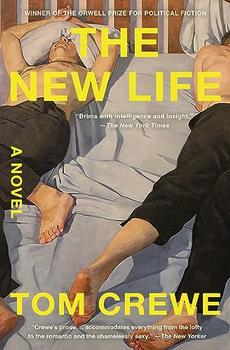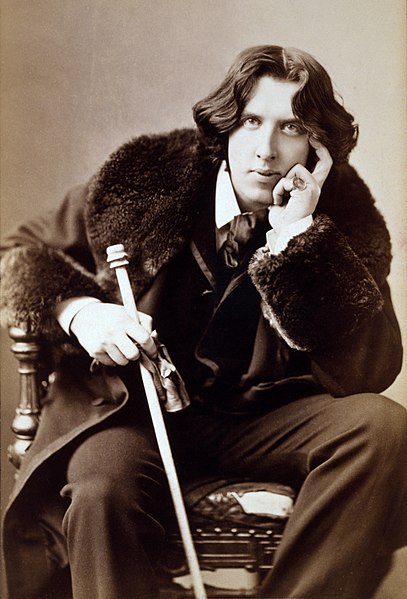Summary | Excerpt | Reading Guide | Reviews | Beyond the Book | Read-Alikes | Genres & Themes | Author Bio

A Novel
by Tom CreweThis article relates to The New Life
 Born in 1854 Dublin to a pair of writers — a father who was a well-known surgeon but also published works on architecture and Irish folklore, and a mother who wrote poetry under a pseudonym — Oscar Wilde went on to himself become an acclaimed poet, playwright and novelist, though his tragic fate overshadowed his literary and artistic success for decades. His most famous works include the poems "The Ballad of Reading Gaol" and "The Sphinx"; the plays The Importance of Being Earnest and Lady Windermere's Fan; and a singular novel, The Picture of Dorian Gray. Today, Wilde is acknowledged as a queer icon, and valorized by students of British (and more specifically, Irish) literature, and the global LGBTQ+ community.
Born in 1854 Dublin to a pair of writers — a father who was a well-known surgeon but also published works on architecture and Irish folklore, and a mother who wrote poetry under a pseudonym — Oscar Wilde went on to himself become an acclaimed poet, playwright and novelist, though his tragic fate overshadowed his literary and artistic success for decades. His most famous works include the poems "The Ballad of Reading Gaol" and "The Sphinx"; the plays The Importance of Being Earnest and Lady Windermere's Fan; and a singular novel, The Picture of Dorian Gray. Today, Wilde is acknowledged as a queer icon, and valorized by students of British (and more specifically, Irish) literature, and the global LGBTQ+ community.
Wilde attended Trinity College, Dublin and Magdalen College, Oxford, where he became involved in the aesthetic movement, which sought to escape the materialism of the Industrial Age by creating beautiful "art for art's sake." The corpus of Wilde's work is heavily informed and influenced by this movement. In his (in)famous preface to The Picture of Dorian Gray, he claims that "There is no such thing as a moral or an immoral book. Books are well written, or badly written. That is all."
This was a claim Wilde tried to support during the trial that derailed his career and arguably ended his life. Although he was married to a woman and had two sons, Wilde began a tumultuous relationship with Alfred "Bosie" Douglas in 1891 that would define his fate. Douglas was the third son of the Marquess of Queensberry, a Scottish nobleman known for his pugilistic, hard-headed personality and for sponsoring and promoting a set of rules for amateur boxing. Queensberry threatened to cut off Bosie's allowance and to disown him unless he ended his relationship with the writer, to which his son replied, "What a funny little man you are."
As Bosie showed no signs of cutting off Wilde, Queensberry got serious. He delivered a letter to Wilde's social club that referred to him as a "somdomite" (he misspelled "sodomite"). Despite the fears of many friends, who all knew that what Queensberry accused Wilde of was true, Wilde decided (with Bosie's encouragement) to take legal action against Queensberry for defamation.
Yet the trial soon took a turn away from libel to something much worse. Queensberry and his lawyers had rounded up witnesses who could attest to Wilde's homosexual acts. Wilde and his legal team quickly dropped the case against Queensberry, but by that time it was too late. On April 26, 1885, a mere three weeks after the first trial had begun, Wilde's criminal trial commenced. It was during this trial that he was famously questioned about the meaning of Douglas's poem "Two Loves," in which love between men is called "the love that dare not speak its name." After the jury was unable to reach a verdict, Wilde was released on bail, but recalled to trial on May 20. This time, the jury declared him guilty on nearly all counts of gross indecency and ruled for the maximum sentence: two years of hard labor.
While in prison, Wilde wrote what is possibly his best-known poem, "The Ballad of Reading Gaol," and "De Profundis," a letter to Douglas that a friend published after Wilde's death. After being released from prison in 1897, Wilde moved to France (many of his friends had encouraged him before the trial to flee there, where anti-homosexuality laws had been relaxed). He died there three years later, likely from an ear infection that spread to his brain. He is buried in Père Lachaise cemetery in Paris, where his grave has remained a site of queer pilgrimage for over a century; it became so popular to kiss the marble tomb and leave a lipstick mark that the cemetery had to put up a plexiglass wall around it.
Oscar Wilde (c. 1882), by Napoleon Sarony
Filed under People, Eras & Events
![]() This "beyond the book article" relates to The New Life. It originally ran in March 2023 and has been updated for the
January 2024 paperback edition.
Go to magazine.
This "beyond the book article" relates to The New Life. It originally ran in March 2023 and has been updated for the
January 2024 paperback edition.
Go to magazine.
Your guide toexceptional books
BookBrowse seeks out and recommends the best in contemporary fiction and nonfiction—books that not only engage and entertain but also deepen our understanding of ourselves and the world around us.